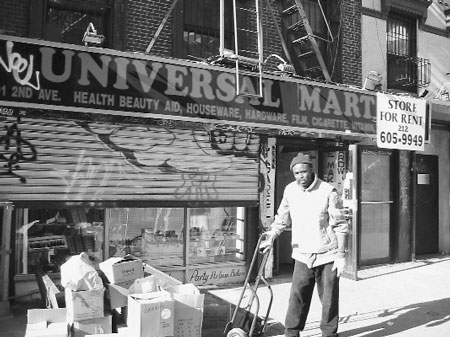By Dan Fiedler
Suzie Yotsukura has stitches on her temple to remind her why she’s closing shop. After nearly a decade, she’s auctioning off the merchandise at Universal Mart, a general hardware store located at 91 Second Ave. between Fifth and Sixth Sts. in the East Village.
Though high rents have caused many small businesses in the neighborhood to close, Yotsukura’s reasons are more complex. In November, she was robbed by eight teenagers who, according to her, made off with nearly $10,000 in cash and merchandise. She suffered a head injury when she was struck during the robbery. Soon afterward, she faced a rent increase between 24 percent and 43 percent — the tipping point in her decision to leave.
Yotsukura and her husband, who jointly owned Universal Mart, will continue to operate an import business. But for other East Village small business owners, leaving isn’t an attractive alternative. Christopher Banner and Monica Minoui of Christopher Banner Hair were fortunate to find a new location for their salon only two blocks away.
As one of the first businesses on the stretch of Fifth St. between Second and Third Aves., Christopher Banner Hair came just shy of its 17th year at the same location. It is a block that Minoui, a hairstylist at the salon for almost 10 years, characterized as a “cross between Mayberry and ‘Seinfeld’ — you watched out for each other.”
Initially, the landlord tried to double the rent at their former space, 217 E. Fifth St. The landlord came down a bit, but not enough for the business to afford. “We were surviving at the rent we were paying,” Minoui said, “and we would have survived had the landlord asked for a reasonable increase.”
To Minoui, the problem is obvious: no rent protection similar to what exists for residents. “There is no ceiling to commercial real estate rates, and there are no protections for small businesses,” she said. She identifies a new type of landlord: young adults taking over buildings owned by their parents, and entrepreneurs from Wall St. buying buildings as an investment. “They have no allegiance to the neighborhood,” she said. “They don’t realize that the store they want to double or triple the rent on helped make the neighborhood more valuable.”
In retrospect, Minoui said they were lucky to be there as long as they were. And she noted that perhaps they were even luckier to find a new space around the corner at 27 E. Third St. Though Christopher Banner Hair was one small business able to survive rising rents and a sluggish economy, Minoui still worries about the neighborhood’s future direction.
“We thought it was just us, but then we added up the number of places we know closing within just a small area,” said Minoui, “and we realized that we weren’t the only small business forced to close or relocate.”
Residents are also noticing this emerging pattern. Anna Sawaryn, chairperson of the Coalition to Save the East Village, a group that consists of approximately 50 different block associations and community groups that originally came together in 2001 to fight Cooper Union’s redevelopment and building plans on Astor Pl. and Cooper Sq, said residents are concerned at what they’ve been noticing.
“Walking around the neighborhood,” Sawaryn said, “we see store after store going out of business on a weekly basis.” She noted that many of the affected businesses have been in the East Village forever and are a part of the community. “Between the developers and bars coming into the area, these small stores don’t really have a chance.”
The Coalition to Save the East Village keeps a list of small businesses in the neighborhood that are closing. High-end establishments are replacing many of these stores. Fifth St. between Second and Third Aves., for example, now hosts an expensive sushi restaurant, a wine merchant and an exclusive catering business. “The whole fabric, the mosaic of this community, is changing rapidly,” Sawaryn said.
As Minoui asked, “Is that what we want as a city?”






































